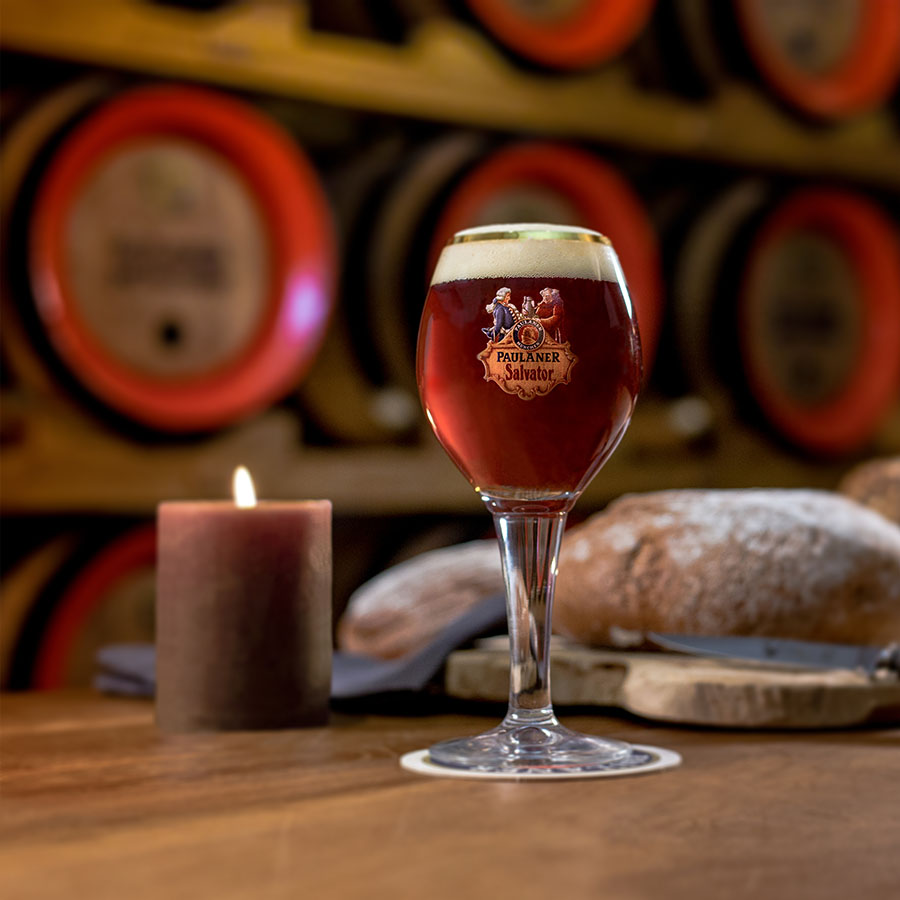Paulaner Münchner Beer Review - The Epitome of German Beer and Culture
When you picture German beer, the chances are that one of Paulaner München’s drinks comes to mind. With 13 different brews, including an iconic Munich Lager, Hefe-Weissbier and Oktoberfest beer, there is no doubt that this brewery embodies the Germanic history and culture in not only its beer taste, but in their commitment and engagement to the Bavarian community.
It all started back in 1634, in a monastery, where monks in Munich brewed a strong beer - the Paulaner Salvator. Brewed naturally, in line with the Purity Laws at the time, this beer is distributed to the poor or sold in the local cloister pub… well, whatever the monks didn’t drink themselves. These monks are depicted on all the labels of Paulaners modern brews, holding a light to their rich heritage. Civilian brewers began to complain to the city council about the hefty competition from the monastery’s brew, and to this date these letters of complaints are considered as the first documented evidence of the Paulaner München Brewery.
Jumping forward to 1751, the Paulaner monks are officially allowed to serve their beer on the day celebrating the father of their order - Salvator. They invited Bavarian Electors to enjoy their first sip of this eponymous brew, which is a ritual that continues to this day. To kick off the Munich Starkbierfest (strong beer festival), the head of the Paulaner Brewery hands the first 1-litre measure of Salvator to the Bavarian minister as an act of recognising this tradition. This is also around the time when the brewery was crowned ‘The Father of Strong Beer’.
With such a fruitful and lengthy history, it is understandable that these monks experienced many changes in their years of brewing. After secularisation in the early 1800s, Franz Xaver Zacherl took over the brewery, and modernised and expanded it. As a result of his efforts, in the common vernacular, Paulaner is now often called ‘Zacherlbrew’.
Moving onwards to 1979, the Schorghuber family took over the majority of the Paulaner Brewery, and it is this entrepreneurial family that maintains the majority of the brewery to this day. With such expansion and still growing, the brewery opened their first brewhouse in Munich as the headquarters of the Paulaner taverns, equipped with its own in-house brewing operation. More brewhouses continued to follow in Beijing, Shanghai, Singapore and St. Petersburg.
Moving to more modern yet still impressive historic feats, in 2016 Paulaner exported 1 million hectolitres to the rest of the world, to be consumed in over 70 countries around the world. To put that in perspective, that is a mind boggling over 175 MILLION pints.
Now, when writing about a world-wide popular German beer, it would be impossible to exclude the inextricable link to the world-famous beer festival Oktoberfest. Paulaner München Brewery was one of the first to obtain a licence to serve beer when the first beer huts appeared at the foundation of this festival, and continue to contribute to the offering to this day. They mark the official start of the annual festival, as it begins when the innkeepers and breweries arrive.
This festival was first held in 1835 on the occasion of Ludwig I and Therese of Bavaria’s silver wedding anniversary, the traditional costumes and sharpshooter parade has been one of the most important events on the Oktoberfest ever since 1950.
One of the modern, iconic Oktoberfest landmarks is the tower of the Paulaner beer tent, which rises 26 metres high in the Munich skyline with its famous beer mug atop. Since 1895, the unique Paulaner beer has been flowing from the taps here.
Paulaner even brew a special Oktoberfest beer, as pictured below. Since 1818, the monks have been brewing this bottom-fermented drink solely during and for Oktoberfest. Many claim this beer to be Germany’s favourite Oktoberfest beer, and it is undoubtedly an institution in Munich. This beer is only brewed for Oktoberfest; that’s where it belongs, along with all the fun.
Today, all Oktoberfest beers must be 13.5 to 13.99 percent original wort extract, and the Paulaner Oktoberfest Bier sits at an alcohol content of around 6 percent. Wort extract is a measure of the solid content originally in the wort, before alcoholic fermentation has commenced to produce the beer. It is one of the major measurements used by brewers to determine the future alcohol content of a beer fermented from a particular wort.
In comparison: the Paulaner Original Münchner Hell has an original wort content of 11.5 percent and an alcohol content of 4.9 percent. The original wort gives the Paulaner Oktoberfest Bier more “body” and makes it taste slightly bitter. Full-bodied, wonderfully drinkable, Oktoberfest Bier enjoyment.
It is undoubted that a brewery so rich in history, equipped with handling centuries of change, and so engaged with the community does in fact make great tasting beer. The beer in question today, Paulaner Original Münchner Hell is a true classic of quintessential Munich food and drink. The beer is clear, bright and golden, and of course boasts the signature white, frothy head. According to tradition, it is usually drunk in the shade of a chestnut tree, in pure Bavarian lifestyle.
Admittedly, it is a beer that goes down well. It is mild, elegant, and with a hint of sweetness. The hops are there in the background, but this is fresh, crisp lager which justifies the reign of the Paulaner München throughout history, and why this brewery continues to be so enriched into modern German culture.
If you enjoyed the Paulaner Munchen Beer review, please feel to share your comments below. We are happy to hear from you!
Written By Ellie Seed
Follow Ellie on Instagram @ellieseed or by clicking here.
Read our other reviews here.
Follow OnlyCans on Instagram here.
Follow OnlyCans on Facebook here.
Follow OnlyCans on LinkedIn here.
Follow OnlyCans on TikTok here.






